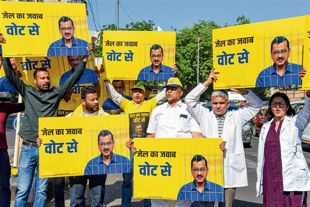
ANCIENT CRY: Jerusalem's Wailing Wall, or Western Wall as it is known in Hebrew, is one of the holiest sites in the world, today. It is the only remnant of the holy edifice that stood on the Temple Mount.
Lt Gen Syed Ata Hasnain (retd)
PRIME Minister Narendra Modi is in Israel for his maiden visit to that country. It is, in fact, the maiden visit of an Indian Prime Minister to Israel. Ever since the end of the Cold War, when the compulsion to support and take sides in the dispute over Palestine finally came to an end, India has steered mid-course, remaining a friend and supporter of the Palestinians,virtual strategic partner of Israel and continuing excellent ties with the Arab countries. A striking similarity of both countries was the timing of India's Independence and Israel's creation in 1947-48. Both countries fought wars right at their inception and the problems related to those wars continue even now, in both cases. In India's case, Jammu and Kashmir-based separatism and terrorism and in Israel's domain Hamas and Hezbollah-led activities with political backing from regular nations remain the challenge. Whereas Israel's threats have comparatively reduced over the years due to its proactive military dominance in its region, India's have multiplied manifold. The regional dynamics are different no doubt but both nations are located in potential cauldrons of wide-ranging conflicts with unpredictable triggers.
My personal take on Israel has always been one of admiration. It has given outstanding models of strategic thought, intelligence, governance and technology to punch much above its weight. Among the major reasons for its strategic confidence are the backing and support from US and its own ability to take decisions and proactive action against adversaries without much concern for international opinion. I had the good fortune of visiting Israel some years ago as part of an international study group which had access at very high levels. The visit took me through Tel Aviv, Jerusalem, West Bank and Ramallah, Nazareth, Galilee, the Lebanon border and finally Haifa. There were visits to some fascinating hi-tech research facilities and defence establishments with focus on micro drones and night-surveillance devices. Keeping a strategic overview, I absorbed everything which makes Israel what it is in terms of its strategic national security. It was obvious that constraints of real estate played on the Israeli mind and drove much of its security thinking. It could not afford risk and therefore proactivity was the essence. Loss of territory was just not acceptable and to give itself depth Israel had taken some bold decisions in 1967. Although these decisions promoted its physical security also brought it lasting enmity. What I observed in all the briefings was the high level of clarity in thinking and virtual political consensus on matters of security. I realised this was a huge plus in planning and execution of national security. The other very noticeable aspect in Israel's outlook towards security was the absence of rancour in the media. Having fought multiple conventional conflicts and experienced irregular threats almost from its foundation, very little social antipathy was expressed in the media although professionally there was no dilution in attitude towards anyone.
It's in the geopolitical and security domains that the major commonalties of Indian and Israeli interests lie. However, one cannot but appreciate the fact that Israel's proclivity towards hi-tech research in the field of agriculture, metallurgy and even nuclear science is of great interest to India. Besides that, a small nation with high threats always innovates and Israel is probably the most outstanding example of that dictum. Institutional exchanges on education in design, research and development and startups will always be to mutual advantage.
In the purely geopolitical domain, Israel has over time appreciated India's problems of extending unequivocal support to its cause. There were compulsions of policies adopted by India in the past. Even after 1991, Israel was aware that India was still walking a tightrope. Its energy needs came from the Arab world. Prime Minister Modi's earlier visits to the UAE and Saudi Arabia finally helped cement an equation with the Gulf which opened the way for an equally, if not more, transformational relationship with Israel.
Geopolitically, there is another way of looking at this. As Iran's antipathy towards Israel increased, especially during the time of Ahmadinejad, and its nuclear ambitions started becoming evident it was clear that the relationship between Israel and Saudi Arabia, backed by the US, would improve. This appeared to have an overall positive effect on Israel's relationships with the Arab world, except with those elements supported by Iran. It opened a window for India without risk to its relationship with the Arabs. Iran already being under sanctions gave little scope for enhancing Indo-Iran relations. The overall effect of the dynamics of this emerging situation was a flow of positive energy through Indo-Israeli relations.
The only casualty appeared to be Palestine which till as late as President Pranab Mukherjee's visit in 2015 was on the tour map which took him to Israel, Palestine and Jordan. The dwindling importance of Palestine could be considered a momentary phenomenon. However, it seems the hyphenation of Israel and Palestine is finally over even in the mind of India one of Palestine's major supporters in the heyday. The one aspect which can in a stroke drastically reduce threats in West Asia is a potential improvement in the relationship between Iran and Israel. Unfortunately, there are complex equations in this and is unlikely to see the light of day in the current set-up. Notwithstanding the Iranian Grand Ayatollah's recent support to the Kashmiri separatists, which appeared more tactical than anything else, India is one country which can be a potential interlocutor, the moment for which is yet far.
While the intelligence and military-to-military relationship continues to thrive, the visit of Prime Minister Modi and the manner of his reception and conduct should finally place the last nail in the coffin of uncertainty and tentativeness in Indo-Israeli relations. From now onwards, this should take the shape of a transformational relationship, especially since there is so much that the two nations have yet to achieve for their people.
The writer, a former GOC of the Srinagar-based 15 Corps, is now associated with the Vivekanand International Foundation & the Institute of Peace and Conflict Studies.



























